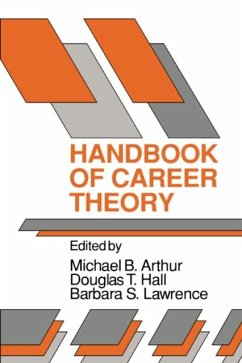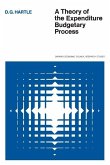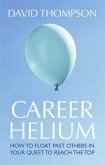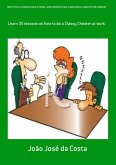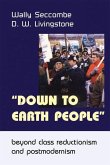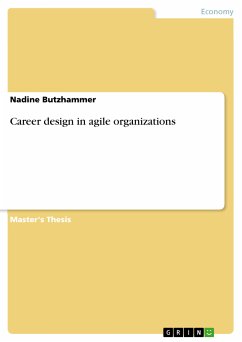Handbook of Career Theory (eBook, PDF)
Redaktion: Arthur, Michael B.


Alle Infos zum eBook verschenken

Handbook of Career Theory (eBook, PDF)
Redaktion: Arthur, Michael B.
- Format: PDF
- Merkliste
- Auf die Merkliste
- Bewerten Bewerten
- Teilen
- Produkt teilen
- Produkterinnerung
- Produkterinnerung

Hier können Sie sich einloggen

Bitte loggen Sie sich zunächst in Ihr Kundenkonto ein oder registrieren Sie sich bei bücher.de, um das eBook-Abo tolino select nutzen zu können.
This cross-disciplinary text is designed to appeal to a diversity of social science scholars. The central focus is on new ways of viewing the career, or how working lives unfold over time. Fresh views from psychology, social psychology, sociology, anthropology, organization theory, economics, and political science are among those represented in the twenty-five chapter anthology. The design of the handbook in three parts - current approaches, new ideas, and future directions - is intended to engage the reader in the debate from which new and better career theories can be developed.
- Geräte: PC
- mit Kopierschutz
- eBook Hilfe
- Größe: 39.62MB
- FamilySharing(5)
![The Employment Forecast Survey (eBook, PDF) The Employment Forecast Survey (eBook, PDF)]() Douglas HartleThe Employment Forecast Survey (eBook, PDF)38,95 €
Douglas HartleThe Employment Forecast Survey (eBook, PDF)38,95 €![A Theory of the Expenditure Budgetary Process (eBook, PDF) A Theory of the Expenditure Budgetary Process (eBook, PDF)]() Douglas HartleA Theory of the Expenditure Budgetary Process (eBook, PDF)28,95 €
Douglas HartleA Theory of the Expenditure Budgetary Process (eBook, PDF)28,95 €![Career Helium (eBook, PDF) Career Helium (eBook, PDF)]() David ThompsonCareer Helium (eBook, PDF)5,99 €
David ThompsonCareer Helium (eBook, PDF)5,99 €![How To Play A Cheater Role At Work...and (suprise!) Have A Successful Career In The Company (eBook, PDF) How To Play A Cheater Role At Work...and (suprise!) Have A Successful Career In The Company (eBook, PDF)]() João José Da CostaHow To Play A Cheater Role At Work...and (suprise!) Have A Successful Career In The Company (eBook, PDF)4,49 €
João José Da CostaHow To Play A Cheater Role At Work...and (suprise!) Have A Successful Career In The Company (eBook, PDF)4,49 €![Down to Earth People (eBook, PDF) Down to Earth People (eBook, PDF)]() Wally SeccombeDown to Earth People (eBook, PDF)19,95 €
Wally SeccombeDown to Earth People (eBook, PDF)19,95 €![Career design in agile organizations (eBook, PDF) Career design in agile organizations (eBook, PDF)]() Nadine ButzhammerCareer design in agile organizations (eBook, PDF)36,99 €
Nadine ButzhammerCareer design in agile organizations (eBook, PDF)36,99 €![Career Counseling versus Karriereberatung: Kulturbedingte Abweichungen in der englisch- und deutschsprachigen Beratungsliteratur (eBook, PDF) Career Counseling versus Karriereberatung: Kulturbedingte Abweichungen in der englisch- und deutschsprachigen Beratungsliteratur (eBook, PDF)]() Alexander C. ParetherCareer Counseling versus Karriereberatung: Kulturbedingte Abweichungen in der englisch- und deutschsprachigen Beratungsliteratur (eBook, PDF)44,99 €
Alexander C. ParetherCareer Counseling versus Karriereberatung: Kulturbedingte Abweichungen in der englisch- und deutschsprachigen Beratungsliteratur (eBook, PDF)44,99 €-
-
-
Dieser Download kann aus rechtlichen Gründen nur mit Rechnungsadresse in A, B, BG, CY, CZ, D, DK, EW, E, FIN, F, GR, HR, H, IRL, I, LT, L, LR, M, NL, PL, P, R, S, SLO, SK ausgeliefert werden.
- Produktdetails
- Verlag: Cambridge University Press
- Erscheinungstermin: 25. August 1989
- Englisch
- ISBN-13: 9781316044896
- Artikelnr.: 44011469
- Verlag: Cambridge University Press
- Erscheinungstermin: 25. August 1989
- Englisch
- ISBN-13: 9781316044896
- Artikelnr.: 44011469
- Herstellerkennzeichnung Die Herstellerinformationen sind derzeit nicht verfügbar.
Careers: Introduction to Part I; 1. Generating new directions in career
theroy: the case for a transdisciplinary approach Michael B. Arthur,
Douglas T. Hall, and Barbara S. Lawrence; 2. Trait-factor theories:
traditional cornerstone of career theory Nancy E. Betz, Louise F.
Fitzgerlad, and Raymond E. Hill; 3. Careers, identities, and institutions:
the legacy of the Chicago School of Sociology Stephen R. Barley; 4. The
utility of adult development theory in understanding career adjustment
process Solomon Cytrynbaum and John O. Crites; 5. Developmental views of
careers in organizations Gene W. Dalton; 6. Exploring women's development:
implications for career theory, practice, and research Joan V. Gallos; 7.
The influence of race on career dynamics: theory and research on minority
career experiences David A. Thomas and Clayton P. Alderfer; 8. Asynchronism
in dual-career and family linkages Uma Sekaran and Douglas T. Hall; 9.
Transitions, work histories, and careers Nigel Nicholson and Michael West;
10. Career system profiles and strategic staffing Jeffrey A. Sonnenfeld;
Part II. New Ideas for the Study of Careers: Introduction to Part II; 11.
People as sculptors versus sculpture: the roles of personality and personal
control in organizations Nancy E. Bell and Barry M. Staw; 12. Work, stress,
and careers: a preventive approach to maintaining organizational health
Janina C. Latack; 13. Re-visioning career concepts: a feminist invitation
Judi Marshall; 14. Reciprocity at work: the separate, yet inseparable
possibilities for individual and organizational development Michael B.
Arthur and Kathy E. Kram; 15. Career improvisation in self-designing
organizations Karl E. Weick and Lisa R. Berlinger; 16. Organization career
systems and employee misperceptions James E. Rosenbaum; 17. Blue-collar
careers: meaning and choice in a world of constraints Robert J. Thomas; 18.
A political perspective on careers: interests, networks, and environments
Jeffrey Pfeffer; 19. Rites of passage in work careers Harrison M. Trice and
David A. Morand; 20. Pin stripes, power ties, and personal relationships:
the economics of career strategy Jay B. Barney and Barbara S. Lawrence; 21.
Rhetoric in bureaucratic careers: managing the meaning of management
success Dan Gowler and Karen Legge; 22. The internal and external career: a
theoretical and cross-cultural perspective C. Brooklyn Derr and André
Laurent; Part III. Future Directions for the Development of Career Theory:
Introduction to Part III; 23. Understanding individual experience at work:
comments on the theory and practice of careers Lotte Bailyn; 24.
Propositions linking organizations and careers Paul C. Nystrom and Angeline
W. McArthur; 25. Careers and the wealth of nations: a macro-perspective on
the structure and implications of career forms Rosabeth Moss Kanter;
Indexes.
Careers: Introduction to Part I; 1. Generating new directions in career
theroy: the case for a transdisciplinary approach Michael B. Arthur,
Douglas T. Hall, and Barbara S. Lawrence; 2. Trait-factor theories:
traditional cornerstone of career theory Nancy E. Betz, Louise F.
Fitzgerlad, and Raymond E. Hill; 3. Careers, identities, and institutions:
the legacy of the Chicago School of Sociology Stephen R. Barley; 4. The
utility of adult development theory in understanding career adjustment
process Solomon Cytrynbaum and John O. Crites; 5. Developmental views of
careers in organizations Gene W. Dalton; 6. Exploring women's development:
implications for career theory, practice, and research Joan V. Gallos; 7.
The influence of race on career dynamics: theory and research on minority
career experiences David A. Thomas and Clayton P. Alderfer; 8. Asynchronism
in dual-career and family linkages Uma Sekaran and Douglas T. Hall; 9.
Transitions, work histories, and careers Nigel Nicholson and Michael West;
10. Career system profiles and strategic staffing Jeffrey A. Sonnenfeld;
Part II. New Ideas for the Study of Careers: Introduction to Part II; 11.
People as sculptors versus sculpture: the roles of personality and personal
control in organizations Nancy E. Bell and Barry M. Staw; 12. Work, stress,
and careers: a preventive approach to maintaining organizational health
Janina C. Latack; 13. Re-visioning career concepts: a feminist invitation
Judi Marshall; 14. Reciprocity at work: the separate, yet inseparable
possibilities for individual and organizational development Michael B.
Arthur and Kathy E. Kram; 15. Career improvisation in self-designing
organizations Karl E. Weick and Lisa R. Berlinger; 16. Organization career
systems and employee misperceptions James E. Rosenbaum; 17. Blue-collar
careers: meaning and choice in a world of constraints Robert J. Thomas; 18.
A political perspective on careers: interests, networks, and environments
Jeffrey Pfeffer; 19. Rites of passage in work careers Harrison M. Trice and
David A. Morand; 20. Pin stripes, power ties, and personal relationships:
the economics of career strategy Jay B. Barney and Barbara S. Lawrence; 21.
Rhetoric in bureaucratic careers: managing the meaning of management
success Dan Gowler and Karen Legge; 22. The internal and external career: a
theoretical and cross-cultural perspective C. Brooklyn Derr and André
Laurent; Part III. Future Directions for the Development of Career Theory:
Introduction to Part III; 23. Understanding individual experience at work:
comments on the theory and practice of careers Lotte Bailyn; 24.
Propositions linking organizations and careers Paul C. Nystrom and Angeline
W. McArthur; 25. Careers and the wealth of nations: a macro-perspective on
the structure and implications of career forms Rosabeth Moss Kanter;
Indexes.
